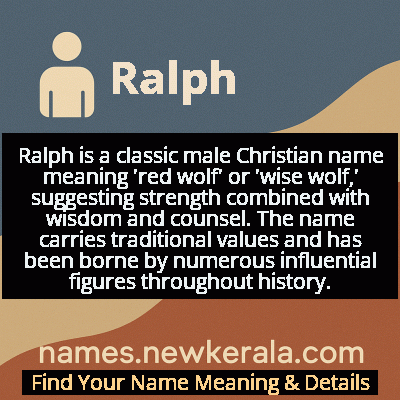Ralph Name Meaning & Details
Origin, Popularity, Numerology Analysis & Name Meaning of Ralph
Discover the origin, meaning, and cultural significance of the name RALPH. Delve into its historical roots and explore the lasting impact it has had on communities and traditions.
Name
Ralph
Gender
Male
Origin
Christian
Lucky Number
1
Meaning of the Name - Ralph
Ralph is a classic male Christian name meaning 'red wolf' or 'wise wolf,' suggesting strength combined with wisdom and counsel. The name carries traditional values and has been borne by numerous influential figures throughout history.
Ralph - Complete Numerology Analysis
Your Numerology Number
Based on Pythagorean Numerology System
Ruling Planet
Sun
Positive Nature
Leaders, ambitious, highly driven, self-reliant, innovative.
Negative Traits
Overly aggressive, domineering, impatient, selfish.
Lucky Colours
Red, orange, gold.
Lucky Days
Sunday.
Lucky Stones
Ruby, garnet.
Harmony Numbers
2, 3, 9.
Best Suited Professions
Entrepreneurs, managers, engineers.
What People Like About You
Courage, determination, leadership.
Famous People Named Ralph
Ralph Waldo Emerson
Essayist, Poet, Philosopher
Leader of the Transcendentalist movement and author of 'Self-Reliance'
Ralph Fiennes
Actor
Acclaimed Shakespearean actor known for roles in 'Schindler's List' and Harry Potter films
Ralph Lauren
Fashion Designer
Founder of global fashion brand Ralph Lauren Corporation
Ralph Vaughan Williams
Composer
Influential English composer known for symphonies and folk song arrangements
Name Variations & International Equivalents
Click on blue names to explore their detailed meanings. Gray names with will be available soon.
Cultural & Historical Significance
Extended Personality Analysis
Individuals named Ralph are often perceived as reliable, thoughtful, and possessing natural leadership qualities. The name's etymology suggesting 'wise wolf' contributes to associations with intelligence combined with strength—someone who thinks strategically before acting. Ralphs are typically seen as grounded individuals with practical wisdom, often serving as stabilizing forces in their families and communities. They tend to be methodical problem-solvers who value tradition while being open to innovation when properly reasoned. Many Ralphs exhibit a quiet confidence rather than overt assertiveness, earning respect through consistent action and integrity rather than flashy displays. The name carries connotations of dependability and depth, with those bearing it often developing expertise in their chosen fields through persistent study and application. This combination of cerebral and practical attributes makes Ralphs particularly effective in roles requiring both analysis and action, from business leadership to creative pursuits.
Modern Usage & Popularity
In contemporary times, Ralph has experienced fluctuating popularity while maintaining its classic appeal. After peaking in the mid-20th century, particularly in the 1940s-1960s when it frequently ranked among the top 100 names in English-speaking countries, the name saw a decline toward the end of the 20th century. However, recent years have shown a modest resurgence as parents seek traditional, strong-sounding names with historical depth. The name remains more popular in the United Kingdom than in the United States, where it currently ranks outside the top 500. Modern usage often pairs Ralph with more contemporary middle names, and the name continues to be favored by families valuing Anglo-Saxon heritage and literary connections. The character Wreck-It Ralph has introduced the name to younger generations, potentially influencing its future popularity among parents who grew up with the franchise.
Symbolic & Spiritual Meanings
Symbolically, Ralph represents the balance between wisdom and strength, drawing from its 'wise wolf' etymology. The wolf imagery suggests loyalty to family and community, keen perception, and survival instincts, while the counsel aspect indicates thoughtful leadership and strategic thinking. In Christian contexts, the name can symbolize spiritual guidance and protection, akin to a shepherd watching over his flock. The combination of animal strength and human wisdom makes Ralph emblematic of integrated masculinity—someone who harnesses primal energy with intellectual discipline. The name also carries connotations of authenticity and substance over superficiality, representing individuals who build lasting legacies through consistent character rather than temporary achievements. This symbolic richness makes Ralph a name that suggests both capability and depth, appealing to those who value meaningful tradition in naming practices.

